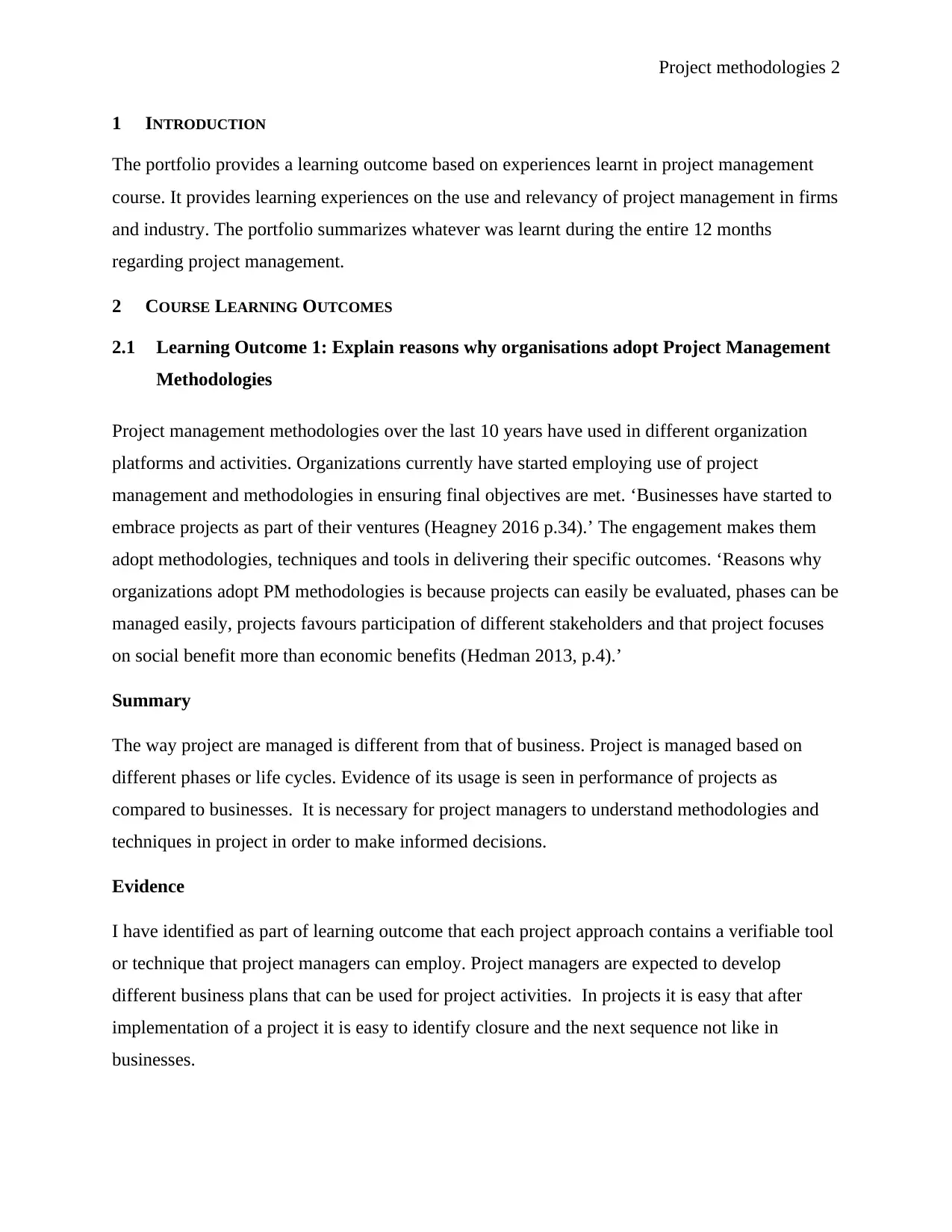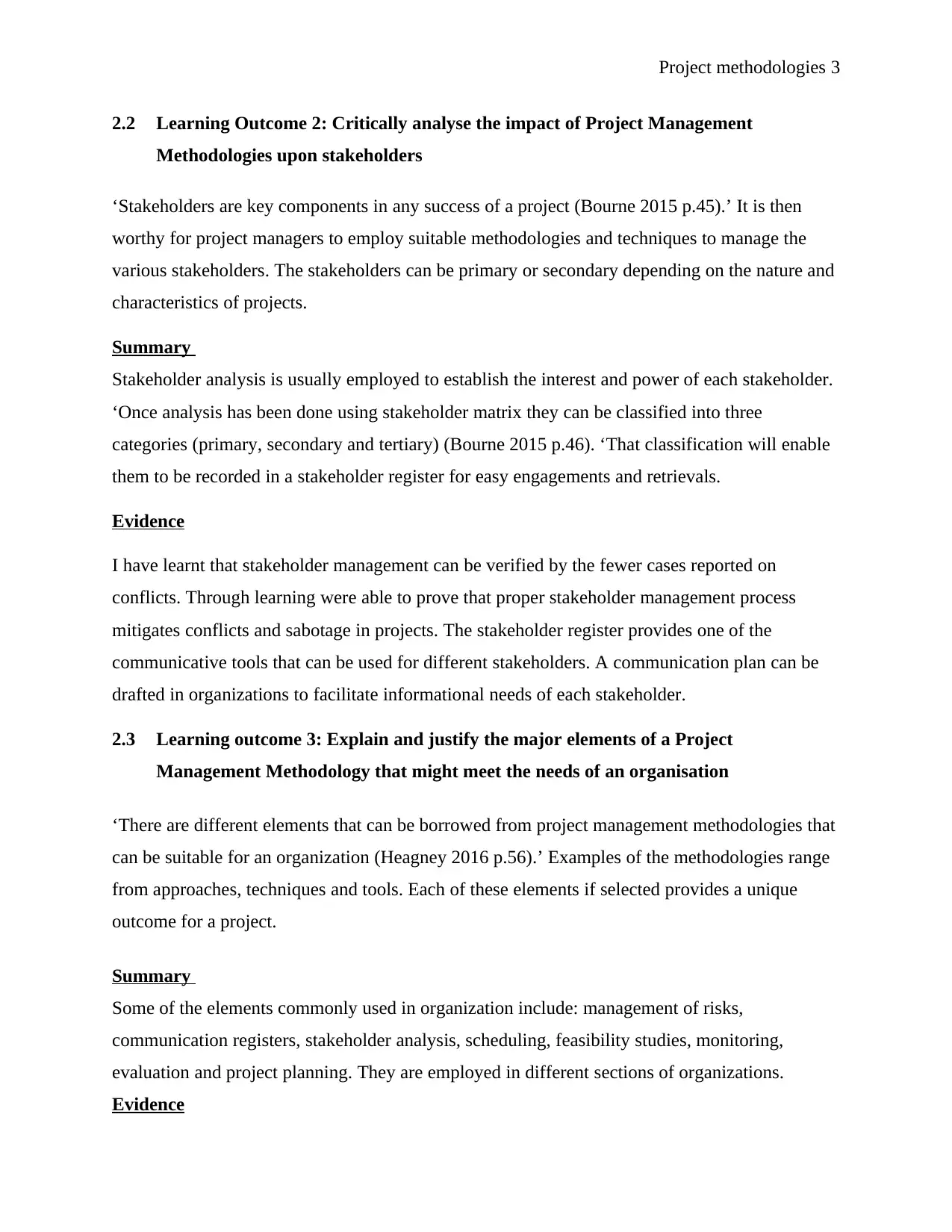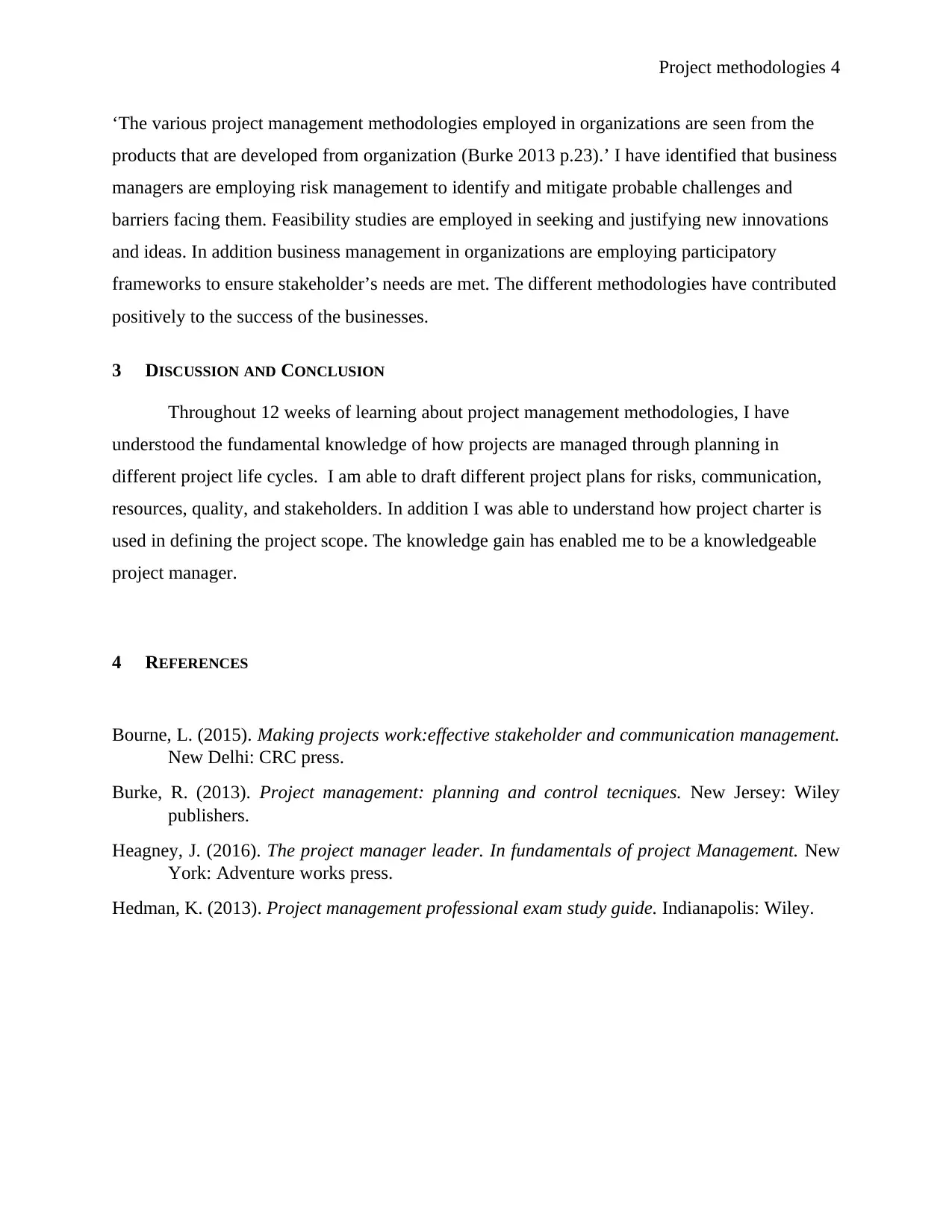Project Management Methodologies: An In-depth Learning Portfolio 2018
VerifiedAdded on 2023/06/11
|4
|924
|473
Portfolio
AI Summary
This learning portfolio provides a comprehensive overview of project management methodologies, based on experiences and knowledge gained over a 12-month course. It covers key learning outcomes such as explaining why organizations adopt project management methodologies, critically analyzing the impact of these methodologies on stakeholders, and justifying the major elements of a project management methodology that meet organizational needs. The portfolio discusses stakeholder analysis, risk management, communication registers, and project planning, supported by references to relevant literature. It concludes with a reflection on the fundamental knowledge acquired, including drafting project plans and understanding the use of project charters, highlighting the development of a knowledgeable project manager. Desklib provides access to similar past papers and solved assignments for students.

Project methodologies 1
A learning portfolio on project management methodologies
Presented by
Student affiliation
Supervisor
1st, June 2018
A learning portfolio on project management methodologies
Presented by
Student affiliation
Supervisor
1st, June 2018
Paraphrase This Document
Need a fresh take? Get an instant paraphrase of this document with our AI Paraphraser

Project methodologies 2
1 INTRODUCTION
The portfolio provides a learning outcome based on experiences learnt in project management
course. It provides learning experiences on the use and relevancy of project management in firms
and industry. The portfolio summarizes whatever was learnt during the entire 12 months
regarding project management.
2 COURSE LEARNING OUTCOMES
2.1 Learning Outcome 1: Explain reasons why organisations adopt Project Management
Methodologies
Project management methodologies over the last 10 years have used in different organization
platforms and activities. Organizations currently have started employing use of project
management and methodologies in ensuring final objectives are met. ‘Businesses have started to
embrace projects as part of their ventures (Heagney 2016 p.34).’ The engagement makes them
adopt methodologies, techniques and tools in delivering their specific outcomes. ‘Reasons why
organizations adopt PM methodologies is because projects can easily be evaluated, phases can be
managed easily, projects favours participation of different stakeholders and that project focuses
on social benefit more than economic benefits (Hedman 2013, p.4).’
Summary
The way project are managed is different from that of business. Project is managed based on
different phases or life cycles. Evidence of its usage is seen in performance of projects as
compared to businesses. It is necessary for project managers to understand methodologies and
techniques in project in order to make informed decisions.
Evidence
I have identified as part of learning outcome that each project approach contains a verifiable tool
or technique that project managers can employ. Project managers are expected to develop
different business plans that can be used for project activities. In projects it is easy that after
implementation of a project it is easy to identify closure and the next sequence not like in
businesses.
1 INTRODUCTION
The portfolio provides a learning outcome based on experiences learnt in project management
course. It provides learning experiences on the use and relevancy of project management in firms
and industry. The portfolio summarizes whatever was learnt during the entire 12 months
regarding project management.
2 COURSE LEARNING OUTCOMES
2.1 Learning Outcome 1: Explain reasons why organisations adopt Project Management
Methodologies
Project management methodologies over the last 10 years have used in different organization
platforms and activities. Organizations currently have started employing use of project
management and methodologies in ensuring final objectives are met. ‘Businesses have started to
embrace projects as part of their ventures (Heagney 2016 p.34).’ The engagement makes them
adopt methodologies, techniques and tools in delivering their specific outcomes. ‘Reasons why
organizations adopt PM methodologies is because projects can easily be evaluated, phases can be
managed easily, projects favours participation of different stakeholders and that project focuses
on social benefit more than economic benefits (Hedman 2013, p.4).’
Summary
The way project are managed is different from that of business. Project is managed based on
different phases or life cycles. Evidence of its usage is seen in performance of projects as
compared to businesses. It is necessary for project managers to understand methodologies and
techniques in project in order to make informed decisions.
Evidence
I have identified as part of learning outcome that each project approach contains a verifiable tool
or technique that project managers can employ. Project managers are expected to develop
different business plans that can be used for project activities. In projects it is easy that after
implementation of a project it is easy to identify closure and the next sequence not like in
businesses.

Project methodologies 3
2.2 Learning Outcome 2: Critically analyse the impact of Project Management
Methodologies upon stakeholders
‘Stakeholders are key components in any success of a project (Bourne 2015 p.45).’ It is then
worthy for project managers to employ suitable methodologies and techniques to manage the
various stakeholders. The stakeholders can be primary or secondary depending on the nature and
characteristics of projects.
Summary
Stakeholder analysis is usually employed to establish the interest and power of each stakeholder.
‘Once analysis has been done using stakeholder matrix they can be classified into three
categories (primary, secondary and tertiary) (Bourne 2015 p.46). ‘That classification will enable
them to be recorded in a stakeholder register for easy engagements and retrievals.
Evidence
I have learnt that stakeholder management can be verified by the fewer cases reported on
conflicts. Through learning were able to prove that proper stakeholder management process
mitigates conflicts and sabotage in projects. The stakeholder register provides one of the
communicative tools that can be used for different stakeholders. A communication plan can be
drafted in organizations to facilitate informational needs of each stakeholder.
2.3 Learning outcome 3: Explain and justify the major elements of a Project
Management Methodology that might meet the needs of an organisation
‘There are different elements that can be borrowed from project management methodologies that
can be suitable for an organization (Heagney 2016 p.56).’ Examples of the methodologies range
from approaches, techniques and tools. Each of these elements if selected provides a unique
outcome for a project.
Summary
Some of the elements commonly used in organization include: management of risks,
communication registers, stakeholder analysis, scheduling, feasibility studies, monitoring,
evaluation and project planning. They are employed in different sections of organizations.
Evidence
2.2 Learning Outcome 2: Critically analyse the impact of Project Management
Methodologies upon stakeholders
‘Stakeholders are key components in any success of a project (Bourne 2015 p.45).’ It is then
worthy for project managers to employ suitable methodologies and techniques to manage the
various stakeholders. The stakeholders can be primary or secondary depending on the nature and
characteristics of projects.
Summary
Stakeholder analysis is usually employed to establish the interest and power of each stakeholder.
‘Once analysis has been done using stakeholder matrix they can be classified into three
categories (primary, secondary and tertiary) (Bourne 2015 p.46). ‘That classification will enable
them to be recorded in a stakeholder register for easy engagements and retrievals.
Evidence
I have learnt that stakeholder management can be verified by the fewer cases reported on
conflicts. Through learning were able to prove that proper stakeholder management process
mitigates conflicts and sabotage in projects. The stakeholder register provides one of the
communicative tools that can be used for different stakeholders. A communication plan can be
drafted in organizations to facilitate informational needs of each stakeholder.
2.3 Learning outcome 3: Explain and justify the major elements of a Project
Management Methodology that might meet the needs of an organisation
‘There are different elements that can be borrowed from project management methodologies that
can be suitable for an organization (Heagney 2016 p.56).’ Examples of the methodologies range
from approaches, techniques and tools. Each of these elements if selected provides a unique
outcome for a project.
Summary
Some of the elements commonly used in organization include: management of risks,
communication registers, stakeholder analysis, scheduling, feasibility studies, monitoring,
evaluation and project planning. They are employed in different sections of organizations.
Evidence
⊘ This is a preview!⊘
Do you want full access?
Subscribe today to unlock all pages.

Trusted by 1+ million students worldwide

Project methodologies 4
‘The various project management methodologies employed in organizations are seen from the
products that are developed from organization (Burke 2013 p.23).’ I have identified that business
managers are employing risk management to identify and mitigate probable challenges and
barriers facing them. Feasibility studies are employed in seeking and justifying new innovations
and ideas. In addition business management in organizations are employing participatory
frameworks to ensure stakeholder’s needs are met. The different methodologies have contributed
positively to the success of the businesses.
3 DISCUSSION AND CONCLUSION
Throughout 12 weeks of learning about project management methodologies, I have
understood the fundamental knowledge of how projects are managed through planning in
different project life cycles. I am able to draft different project plans for risks, communication,
resources, quality, and stakeholders. In addition I was able to understand how project charter is
used in defining the project scope. The knowledge gain has enabled me to be a knowledgeable
project manager.
4 REFERENCES
Bourne, L. (2015). Making projects work:effective stakeholder and communication management.
New Delhi: CRC press.
Burke, R. (2013). Project management: planning and control tecniques. New Jersey: Wiley
publishers.
Heagney, J. (2016). The project manager leader. In fundamentals of project Management. New
York: Adventure works press.
Hedman, K. (2013). Project management professional exam study guide. Indianapolis: Wiley.
‘The various project management methodologies employed in organizations are seen from the
products that are developed from organization (Burke 2013 p.23).’ I have identified that business
managers are employing risk management to identify and mitigate probable challenges and
barriers facing them. Feasibility studies are employed in seeking and justifying new innovations
and ideas. In addition business management in organizations are employing participatory
frameworks to ensure stakeholder’s needs are met. The different methodologies have contributed
positively to the success of the businesses.
3 DISCUSSION AND CONCLUSION
Throughout 12 weeks of learning about project management methodologies, I have
understood the fundamental knowledge of how projects are managed through planning in
different project life cycles. I am able to draft different project plans for risks, communication,
resources, quality, and stakeholders. In addition I was able to understand how project charter is
used in defining the project scope. The knowledge gain has enabled me to be a knowledgeable
project manager.
4 REFERENCES
Bourne, L. (2015). Making projects work:effective stakeholder and communication management.
New Delhi: CRC press.
Burke, R. (2013). Project management: planning and control tecniques. New Jersey: Wiley
publishers.
Heagney, J. (2016). The project manager leader. In fundamentals of project Management. New
York: Adventure works press.
Hedman, K. (2013). Project management professional exam study guide. Indianapolis: Wiley.
1 out of 4
Related Documents
Your All-in-One AI-Powered Toolkit for Academic Success.
+13062052269
info@desklib.com
Available 24*7 on WhatsApp / Email
![[object Object]](/_next/static/media/star-bottom.7253800d.svg)
Unlock your academic potential
Copyright © 2020–2026 A2Z Services. All Rights Reserved. Developed and managed by ZUCOL.


